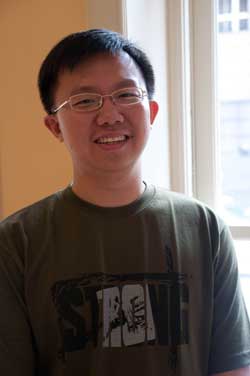Filed Under > TC Community
A Teacher Asks Why
At TC, a young Indonesian hopes to grapple with some really big questions about education
By Siddhartha Mitter
“I want to know whether it’s the government’s role to educate people, or whether it’s the role of families or churches,” says Andi Soemarli Rasak. “I want to learn about epistemology. I want to learn about the nature of human beings.”
That is no small agenda. But TC’s master’s degree program in Philosophy and Education, which Rasak enters this fall on a full scholarship from the Riady Scholars Fund, is a fine place to start. And Rasak’s experience as a mathematics teacher in a Christian high school in his home city of Bandung, Indonesia, has supplied him with practical questions that he looks forward to addressing with the tools of philosophy.
The high school, Cahaya Bangsa Classical School, follows the Classical Christian model, inspired by the thinking of Dorothy L. Sayers, who advocated a return to the medieval “trivium” – meaning “three roads” rather than matters of less consequence – of grammar, logic, and rhetoric. The Bandung school was founded eight years ago through the efforts of an American missionary, Rasak says, and its faculty includes both Indonesians and Americans, many from New Saint Andrews College in Idaho.
The approach combines a Biblical world view with a progression in all subjects from factual learning in the early years (the grammar phase) to argumentation (logic) and more complex presentation (rhetoric). In mathematics, this maps readily to arithmetic, algebra, and advanced topics like calculus, which Rasak teaches to his 11th and 12th-graders.
The standards are high, and Rasak, a committed Christian, enjoys teaching in a school with a religious orientation. But as a young teacher – he has taught just one year at the school, and only graduated from university in Singapore four years ago – he says he wants to understand other approaches as well.
Teachers College, home of John Dewey (“I know he was one of the most progressive thinkers,” Rasak says) was the perfect place to compare approaches to education and understand their philosophical underpinnings.
“It affects the role of the teacher,” Rasak says of the moral foundations of a given teaching method. “It affects how teachers see their students, the spirit of the classroom, and how we engage our students.”
Rasak has never studied philosophy before, at least not formally. His college degree was in electronic engineering, and he was on track for a career in technology until he realized he wanted to serve what he views as a broader purpose.
In part, his motivation came through religion. He had helped run a ministry for teenagers in his church, and this made him realize how much he enjoyed working with youth.
But rather than embark on a lucrative private sector career overseas, he says, he also wanted to give back to Indonesia. “I still have that idealism of nationalism. I wanted to contribute more to my country.”
Rasak hopes to bring the insight and perspectives he forms at TC back to his school in Bandung, and to contribute to the development of the school’s curriculum. “They are quite open to new ideas,” he says of the school’s administration. Down the line, he hopes to make a bigger impact, perhaps on policy. For now, he says, he’s skeptical about public education – at least in Indonesia – and more of a believer in home schooling and religious schools.
But that could change. As a new student of philosophy, Rasak wants to put his biases and habits to the side, and learn to think about education from the foundation up.
“As modern people, we tend to want to know how to do things; we don’t dig deeper to understand why,” Rasak says. “That’s why philosophy is so important.”
Published Friday, Aug. 31, 2012
